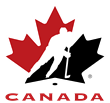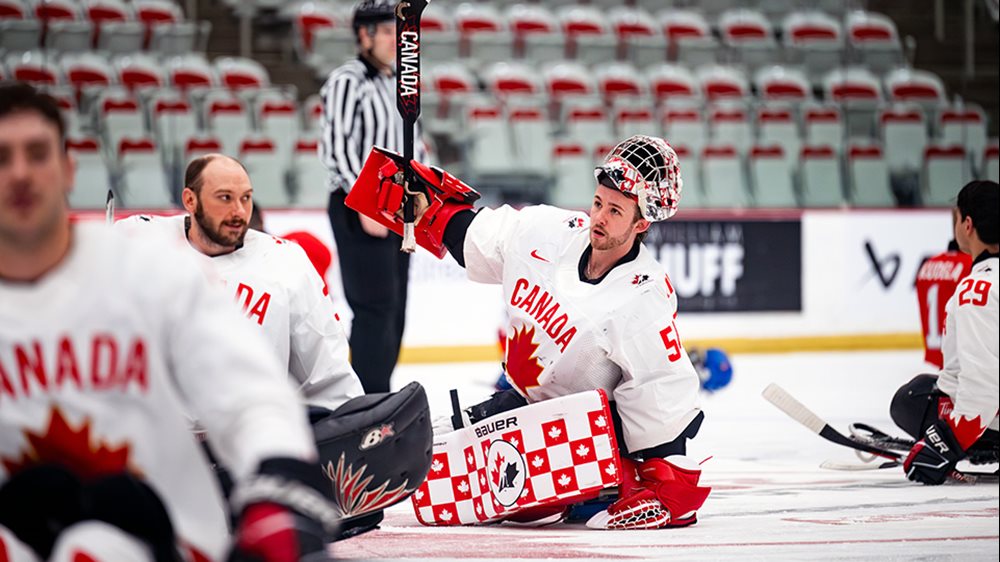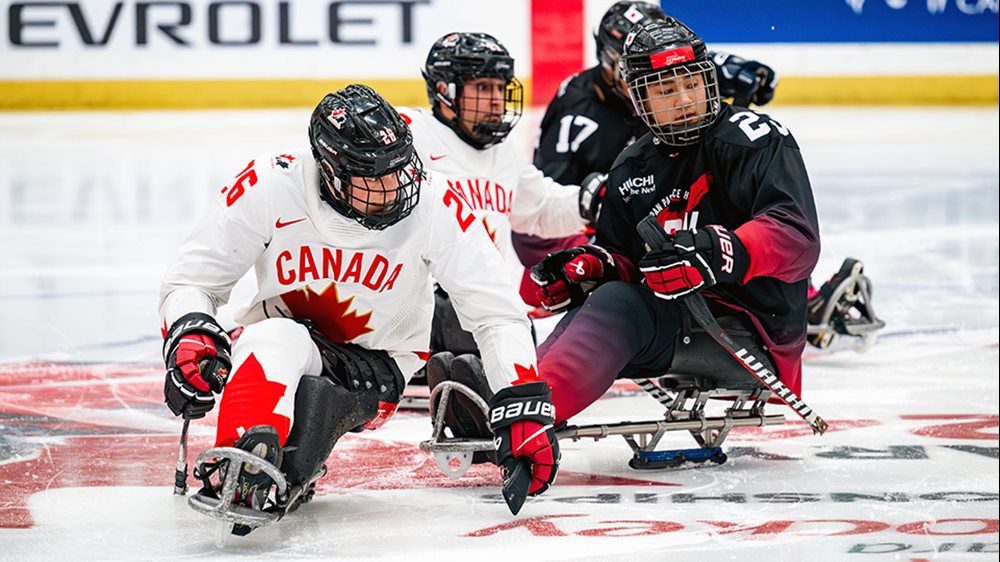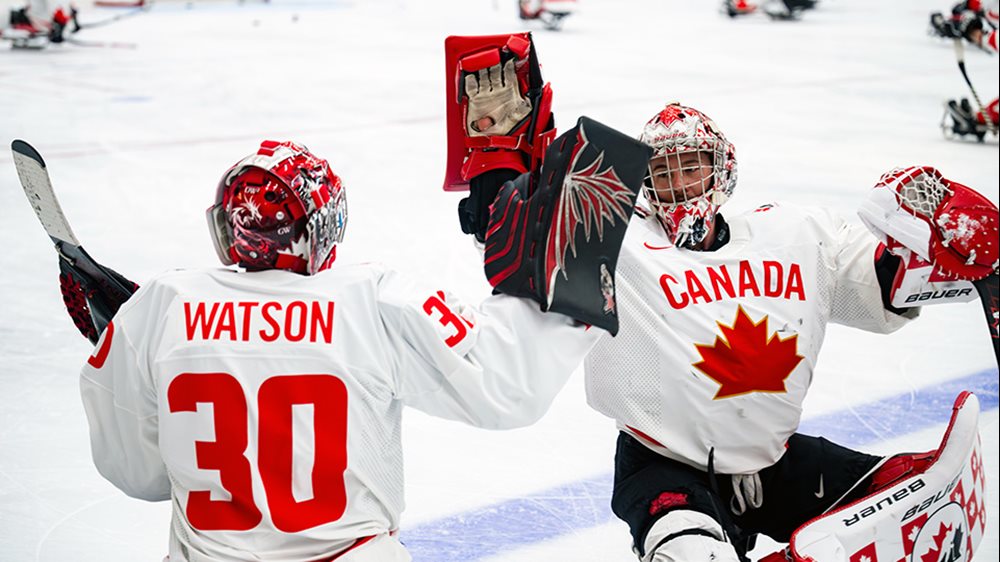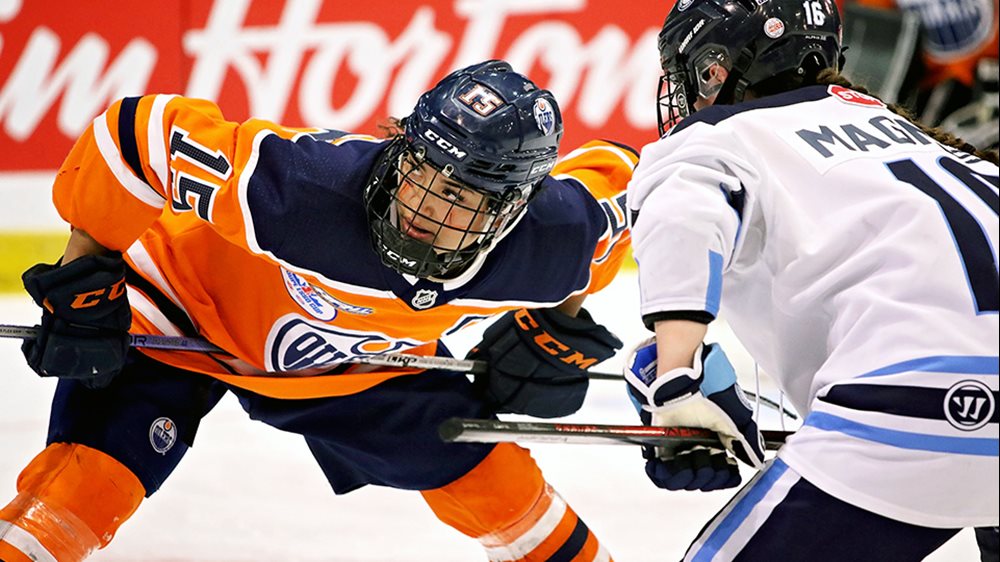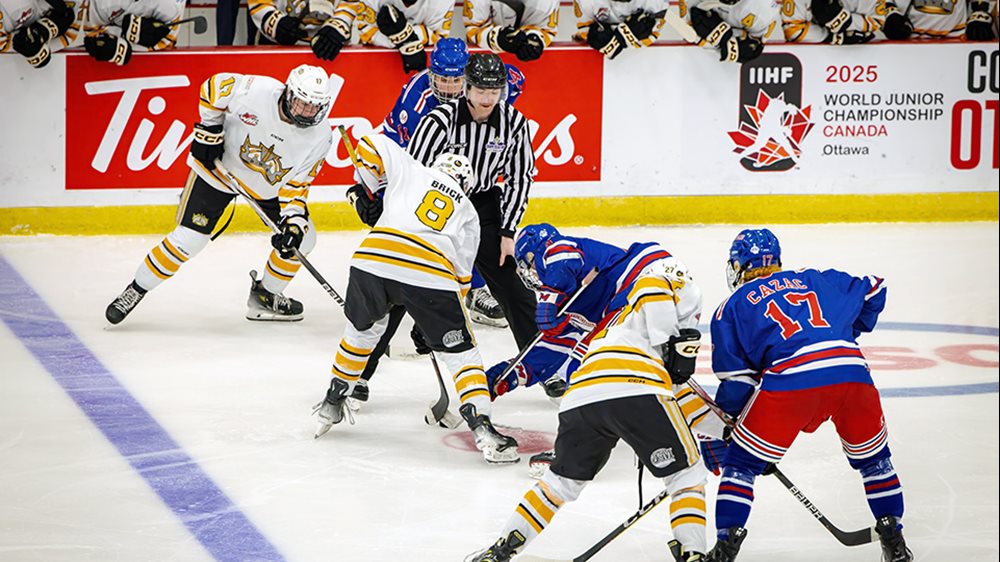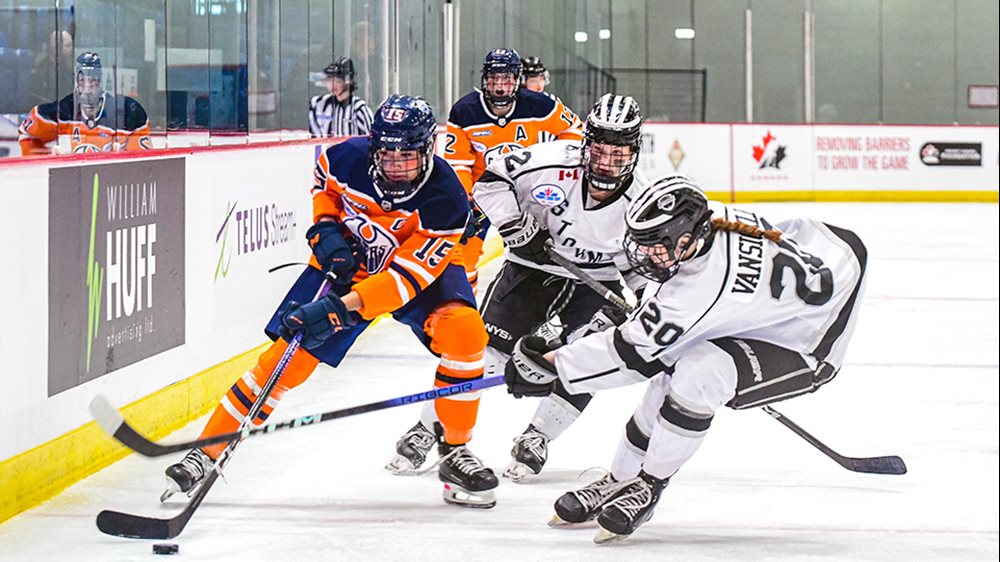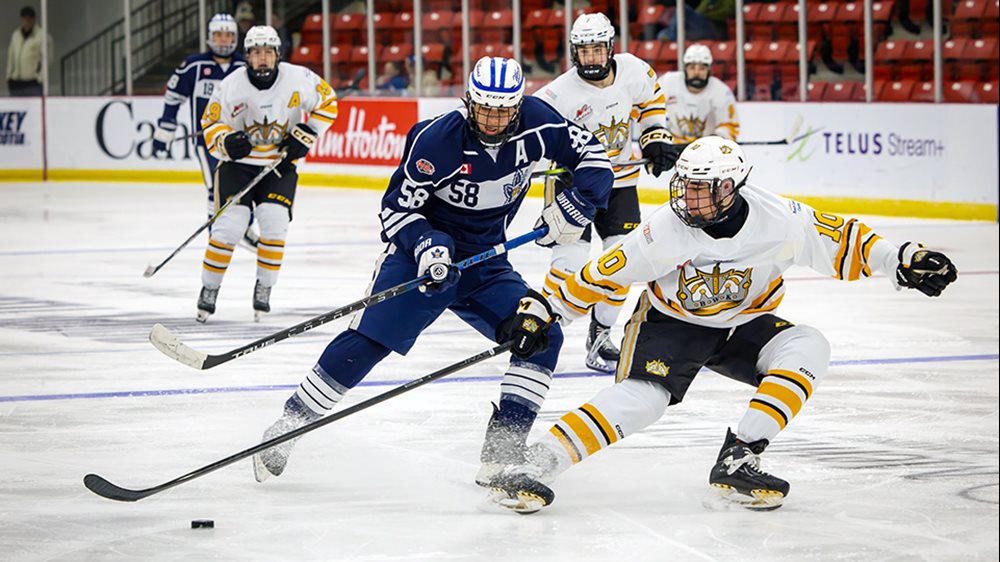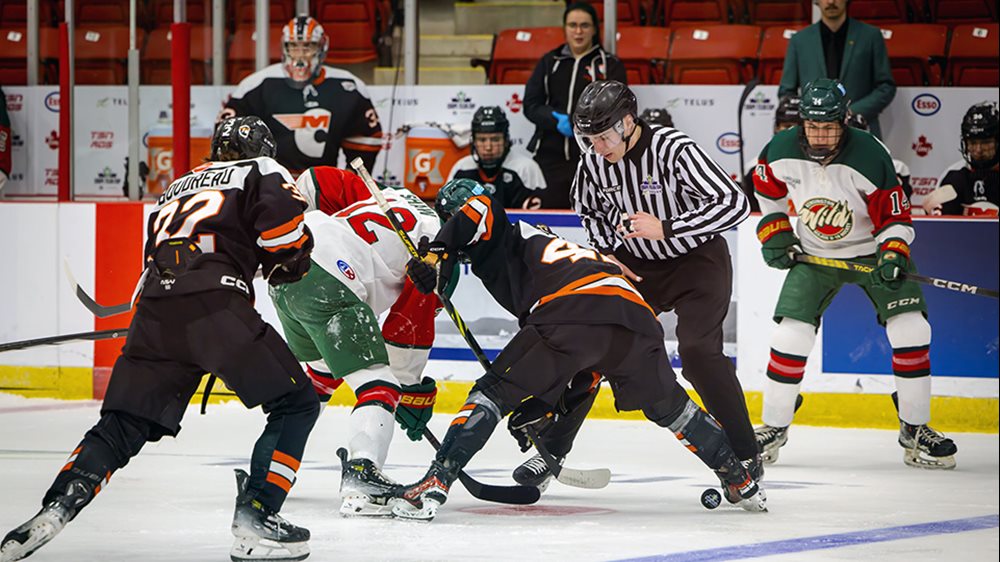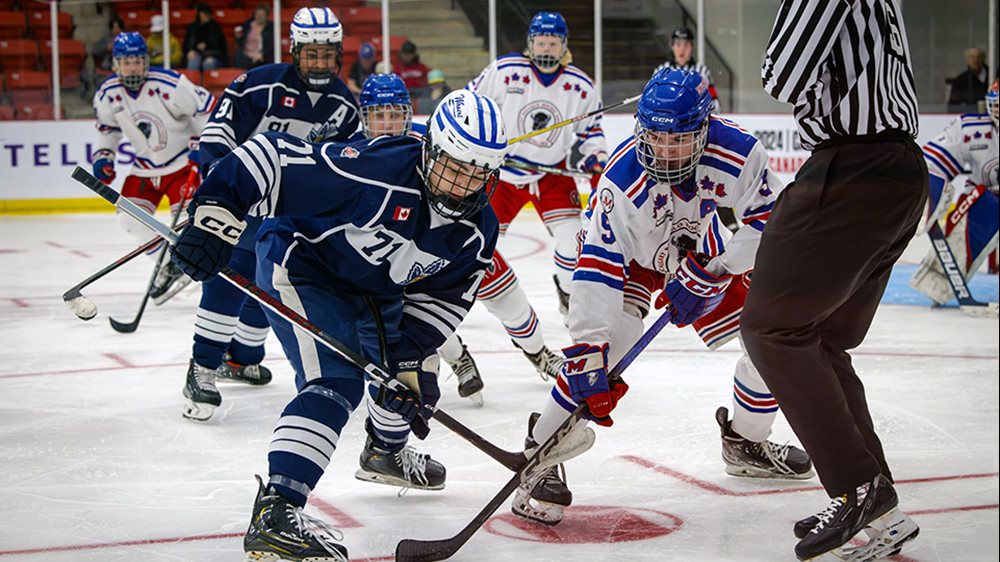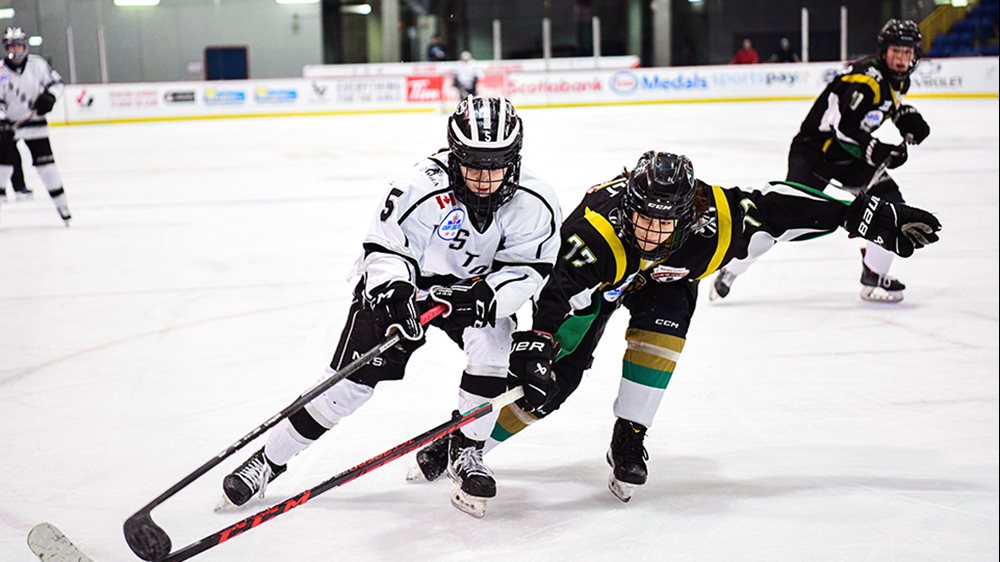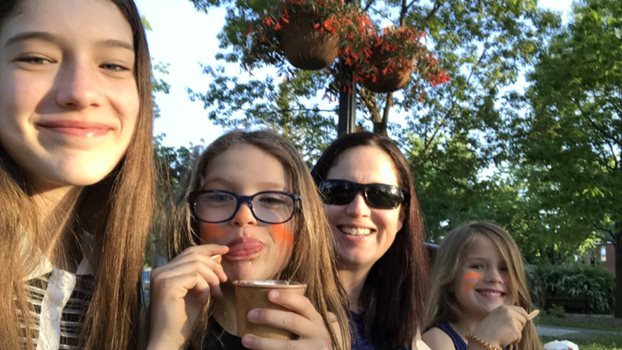
A hands-on hockey mom
A BFL Female Coach of the Year, Stéphanie Grenier is guiding her three daughters – and hundreds of other girls in the AHFVG – through their minor hockey journeys
The focus for Stéphanie Grenier has always been on getting more girls involved in hockey.
The mother of three has worn multiple hats for the Association hockey féminin vallée de Gatineau (AHFVG), including coach, registrar and recruiter, and her efforts earned her the BFL Female Coach of the Year Award (Community) for Quebec.
“It was a big surprise to me. I didn’t know that my association nominated me and put my name forward for the award,” says Grenier. “I was happy that my work was recognized over the years.”
The 40-year-old didn’t play the game growing up, got on the ice in her adult years and was quick to get involved when she signed up two of her daughters to play with the AHFVG.
She didn’t view herself as a “real hockey player,” but after being asked to help with her then four-year-old daughter’s team, Grenier has never stopped working with teams across the association.
“With the kids being so young they needed more coaches on the ice to help, and since I played hockey here and there, I decided to jump in and help,” she said. “The person in charge was happy to have women on the ice to set an example for the younger girls.”
Two years later, Grenier took over the Initiation (now Timbits U7) program for the AHFVG. For the past seven years she has been an assistant coach with her middle daughter’s team, supports her oldest daughter’s team, and is the head coach for her youngest daughter’s team.
Phew. That’s a lot of hockey.
On her nomination form, Sonia Bertrand, president of the AHFVG, said that Grenier is a positive role model for young girls. As the registrar and recruiter, she works hard to attract as many players as possible to promote and grow the game in Gatineau.
“I hope through the next few years, we can get more women involved with hockey. It is nice for the girls to have women on the ice with them and to have examples of hockey players in their community,” Grenier says. “It will give them a sense that they too can play university hockey or coach later in life.”
Not only does Grenier dedicate a lot of her time in recruiting girls to join the AHFVG, but she also actively looks for mothers to get involved with coaching their young daughters.
“When I learn that a mom used to play hockey when she was younger, I always try to get them involved,” she says. “I feel like some women don’t think they are good enough or whatever, but as soon as they get involved, they remember how much they enjoy being on the ice and usually stay involved.”
According to Bertrand, Grenier’s cheerfulness, energy and dedication represent all the qualities a coach must possess to help athletes progress along the path of life.
Even in the middle of a challenging season with few wins, Grenier was focused on the long-term development and little wins of each player.
“I love to see the improvements of the girls throughout the season,” she says. “I love to see them starting out and almost not being able to skate, and then at the end of the season, they make a stop – it is just so great to see,” she said. “I love being involved and seeing the girls smiling and them seeing what they are capable of doing.”
Life is busy at the rink for Grenier and her three daughters, but she wants to help grow the game in Gatineau.
“It is fun watching these girls come out of their shells as they play. It is great to see them make friends and keep playing year after year,” she says. “Hopefully, we can continue to grow our association.”
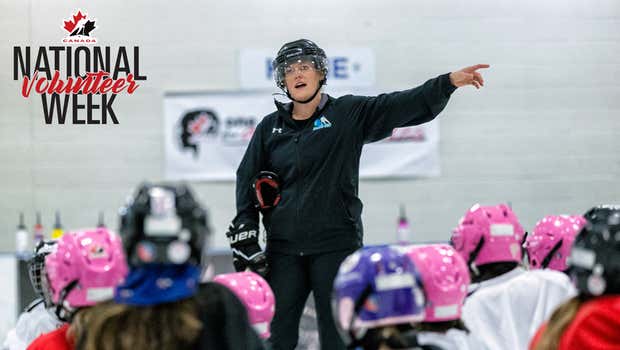
Making an impact in the North
A game-changer in women’s hockey, Kaylee Grant tirelessly gives her time across the territories, volunteering to ensure opportunities exist for women and girls
The first thing Kaylee Grant did when she moved to Yellowknife was find a hockey team.
The operating engineer took a one-year term to gain experience in her industry. Twelve years later, she’s still in the Northwest Territories and hockey has been a reason why she calls it home.
“You gravitate to what you know, and I knew sports,” Grant says. “When you join a sport, you instantly have 17 friends and a group where you feel accepted through a common goal and interest. When I moved to the North, I didn’t know how else to meet friends, so I went to the rink right away.”
Grant grew up around the rink in Antigonish, Nova Scotia. The community was also a hockey hotbed, supporting its Junior A, Junior B and university teams. Being around that passion and community made hockey an important part of her life.
“Playing hockey is what we did,” Grant says. “The community rallied behind our teams and the rinks were full, the atmosphere was great, and hockey was so prominent.”
She played minor hockey in Nova Scotia before moving to Newfoundland and Labrador to play at Memorial University. At 23 years old, she made the move to Yellowknife and knew she would find her community inside a rink.
“I find that the easiest thing to do when you come to a new place to meet people is through sport,” she says. “With joining a hockey team, I was already creating a group of people that were like-minded in interests and similar age. Plus, there are so many opportunities in the North to grow as coaches, players and mentors that have been so helpful.”
Grant’s love for the game wasn’t just as a player—she expanded her knowledge
by getting into coaching while in Nova Scotia. She started as an off-ice
coordinator with the Antigonish Bulldogs women’s under-18 team.
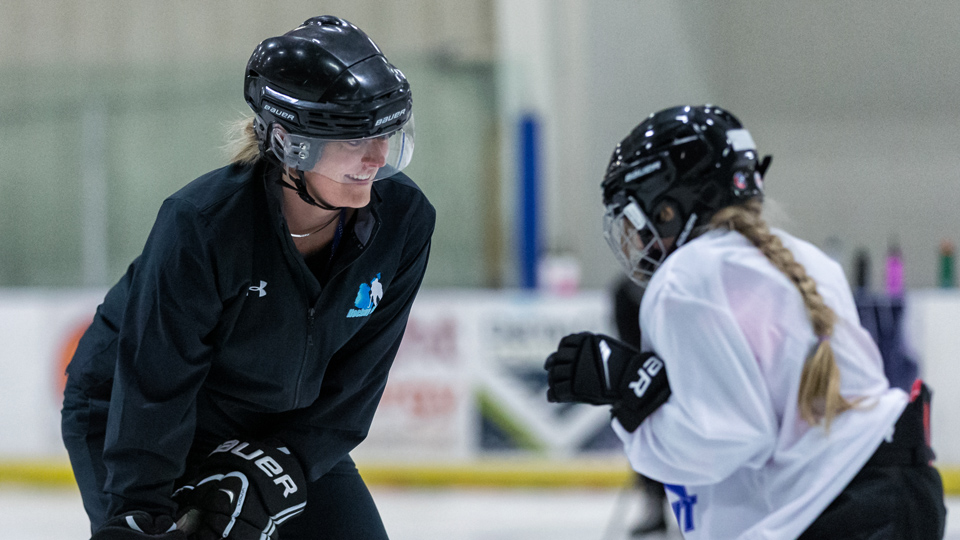
She did her Coach Development 1 training before getting her High Performance 1 training and evaluation certification. She continued to pursue additional coaching certification and training over the years to educate herself and give back to her community.
“I think seeing the female game continuously grow and develop that keeps me interested,” Grant says. “I love to see the progress in my players. I love seeing these players grow and adapt as individuals. Seeing them get involved in coaching is the coolest part.”
Her coaching philosophy is to develop a player’s passion for the game, be a role model and create an environment that is positive for women and girls.
Coaching and mentoring young girls are important to Grant, and she saw that path was through high-level opportunities, particularly by becoming a facilitator to drive more players into the coaching route. She has been working with Hockey North and the Hockey Canada Women Master Coach Developer program, which is focused on removing barriers to coaching education for women.
“Kaylee has volunteered at pretty much every level and she’s getting more involved with training coaches and being a clinician, which is an amazing progression for her,” says Kyle Kugler, executive director of Hockey North and a close friend of Grant. “She’s a great ambassador for hockey by giving back to other coaches through her experiences and helping with their development.”
Through being a volunteer coach, Grant has been able to experience some highlights with her teams, including as head coach for the Arctic Winter Games and Canada Winter Games, and as an assistant coach for Team North at the National Aboriginal Hockey Championship.
“Hockey North has given me so many opportunities and having that support has impacted me as a coach,” Grant says. “I enjoyed every year with those territorial teams and those experiences are a very big reason why I stay here – the coaching opportunities and knowing that we continually have room to grow.”
Another event that Grant was a key volunteer for was the inaugural One For All festival held in Yellowknife in February. It was a four-day event for women and girls from across the N.W.T. and Nunavut that included goaltending clinics, on-ice scrimmages and other off-ice experiences. The event was launched in partnership with Hockey Canada and Hockey North to celebrate the sport and grow grassroots hockey in the North.
“Kaylee is one of our co-leads in the North, and when we set out to deliver this programming in Yellowknife, it was a no-brainer that she would be involved. And typical Kaylee, she just runs with a task and completely owns it,” says Katie Greenway, manager of women’s and girls’ hockey with Hockey Canada. “To have champions like Kaylee that dedicate themselves to their community and sport is so important.”
Giving back through coaching is just what Grant does—it’s like a hobby for her and she does it for others and to see more women in the sport, not for what it could bring to her.
“I’ve known Kaylee for a few years now and she has so much on her plate, but she never says no,” Greenway says. “She doesn’t do it for the accolades, but out of the goodness of her heart with a smile on her face. She’s fantastic and is really impacting everyone that she comes across.”
Grant’s impact on hockey in the North has been felt by many of the girls she has coached, mentored and played with over the past 12 years, but it’s the bigger picture that is most important to her.
“I’m not going to say that myself, individually, has drastically impacted female hockey in the North. I think I am a very small portion of what’s been going on in the North in the last 10 years,” Grant says. “I would like to think that I have helped develop more female coaches and I’ve been a good role model. I think if I have impacted hockey in the North, its pushing players to want to coach a little bit, but it’s a collective—everyone has left their mark on the female game.”
For Kugler, as the lone administrator for Hockey North, having volunteers like Kaylee is so critical to the work and development of hockey players.
“I think volunteers are essential for the delivery of anything in small communities in the North,” he says. “[Kaylee] takes on more than we even realize. Coaches have a huge influence on teams and athletes and she’s a positive role model and advocate for female hockey. She’s selfless with her time and she’s just an awesome person.”
Interested in becoming a coach? Visit HockeyCanada.ca/Coaching, or contact your local hockey association or Hockey Canada Member for more information.
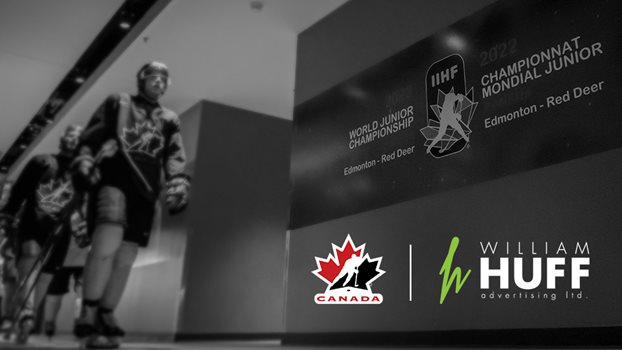
Hockey Canada welcomes William Huff Advertising as National Marketing Partner
Partnership expands William Huff's affiliation with prominent Canadian sports brands
CALGARY, AB – Hockey Canada has announced that William Huff Advertising Ltd. has become its newest National Marketing Partner through an agreement that is effective immediately. One of Canada’s leading producers in signage, William Huff’s portfolio of clients includes the Calgary Flames and Edmonton Oilers, among other notable sports and events properties.
“William Huff has been producing top quality signage for local and national sports organizations throughout our 75 years in business,” said Bruce Simpson, owner of William Huff Advertising Ltd. “It was a natural fit for us to partner with Hockey Canada and we are very proud to support the organization’s grassroots, men’s, women’s and para hockey programs. Hockey is such an important part of Canada’s identity and we hope our partnership will help athletes become the best they can be.
“Our commitment to professional and amateur sports is something we are very proud of, and as a partner with several sports and community organizations, we are pleased to add Hockey Canada to that list. Go Canada Go."
As part of the partnership, William Huff will produce signage for national and international events hosted by Hockey Canada. William Huff will also be recognized in-venue, including throughout the upcoming fall event schedule.
“Hockey Canada is thrilled to welcome William Huff as a National Marketing Partner,” said Dean McIntosh, vice-president of strategic partnerships and community impact for Hockey Canada. “Throughout our time working together, which includes the 2022 and 2023 IIHF World Junior Championships, we have continued to expand our partnership, and formalizing it today to officially welcome William Huff as an official partner of Hockey Canada is an exciting step for both organizations.”
To learn more about Hockey Canada, please visit HockeyCanada.ca, or follow along through social media on Facebook, X and Instagram.
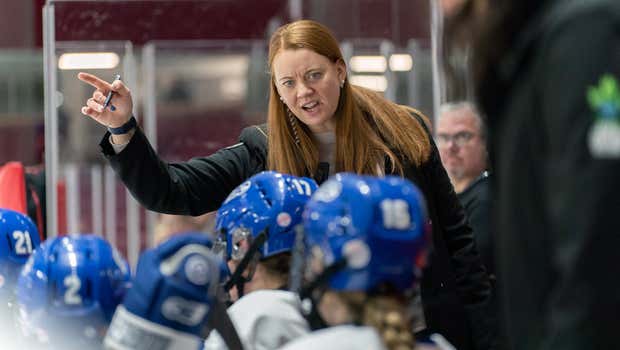
From stage lights to hockey heights
After transitioning from improv acting to coaching high-level hockey, Whitney Juszkiewicz continues to flourish behind the bench
Before the gold medal, the accolades and the countless hours behind the bench coaching high-level hockey, Whitney Juszkiewicz was an improv actor in Vancouver.
“I was on stage every Sunday throwing on an attitude, throwing on an accent, throwing on a persona and going for it,” recalls Juszkiewicz.
Born in Alberta, Juszkiewicz grew up in Edmonton and was deeply involved in hockey, attending St. Francis Xavier High Performance Hockey Academy before enrolling at the University of Saskatchewan, where she studied liberal arts and was a member of the Huskies hockey team. She then studied live performance at Red Deer Polytechnic before embarking on a career in live performance.
“I spent almost eight years in the film, television and theatre industry and I did a lot of stuff in Red Deer,” Juszkiewicz says. “My friends and I then started a theatre company (BullSkit) that specialized in improv and sketch comedy like Saturday Night Live or Second City.”
By 2012, Juszkiewicz was living in Vancouver, running her theatre company, performing improv and providing hockey lessons to kids. It was after one of those lessons that a parent asked if she had ever considered coaching hockey. After thinking it over, Juszkiewicz decided to go for it and soon found herself behind the bench of a Vancouver-area U11 boys’ team.
“I must have done a pretty good job because in my first year I won rookie coach of the year,” she says.
A little more than a decade later, Juszkiewicz is now a respected high-performance hockey coach, having been behind the bench of numerous high-level boys’ and girls’ teams throughout Greater Vancouver, and the owner of Fire and Ice Hockey Development. She has held also held various coaching-related positions with BC Hockey, briefly served as the executive director of the Langley Minor Hockey Association, became a certified Hockey Canada Skills Coach and worked as a female coach mentor with the NHL Coaches’ Association during that time.
“I put the coaching hat on and I haven’t looked back,” says Juszkiewicz, who is also a coach in the B.C. provincial program, an associate coach with a U18 Prep team at the Delta Hockey Academy and head coach of a female U15 AAA team in the Pacific Coast Amateur Hockey Association.
In February, as an assistant coach, Juszkiewicz helped Team BC win its first-ever gold medal in women’s hockey at the 2023 Canada Winter Games.
“It was a privilege to work with those young women, some of whom went on to win gold at the women’s under-18 world championship,” she says. “It was just an unbelievable experience and it will definitely be one of my all-time favourite memories as a coach.”
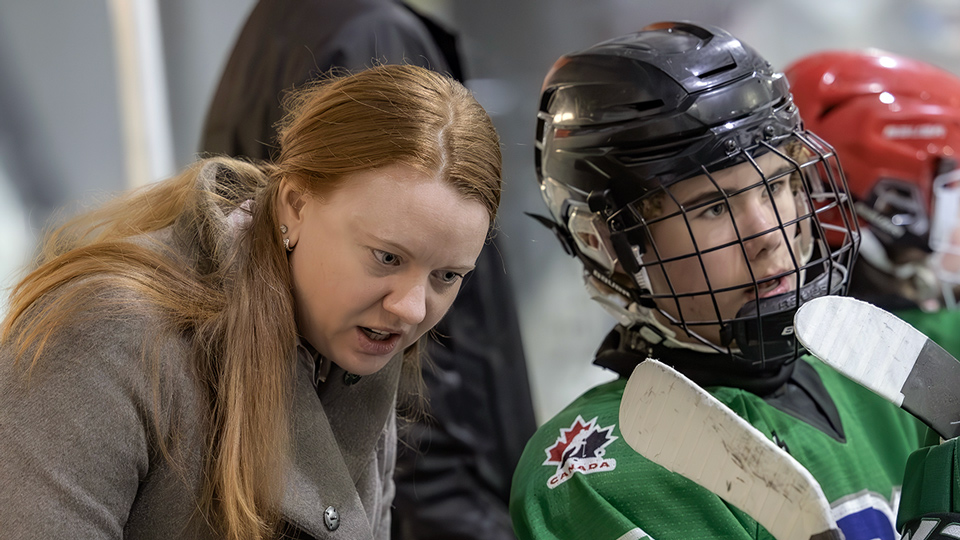
Same skills, different role
Although Juszkiewicz is no longer performing improv on weekends, she has found that many of the skills she developed as an actor have transferred over into the coaching world.
“[Coaching] hockey is reading the room and understanding that this may not be the right time to really drill in the negatives and that everyone needs a little bit of a bump, they need value,” she says.
In the acting world, Juszkiewicz says, a strong emphasis is placed on organization, understanding objectives and having everyone buy into their roles to ensure everything is successful, just like it is in hockey.
“You have the best shows when everybody understands the objective and I find the coaching world is very much like that,” says Juszkiewicz, who continues to dabble in acting, having appeared as an extra in Mighty Ducks: Game Changers. “Everyone's got a job, everyone's got a special talent that they're bringing; there is a reason why they're there and if we can just dig into those specialties and create a nice, inclusive, safe environment, we're going to have a great time.”
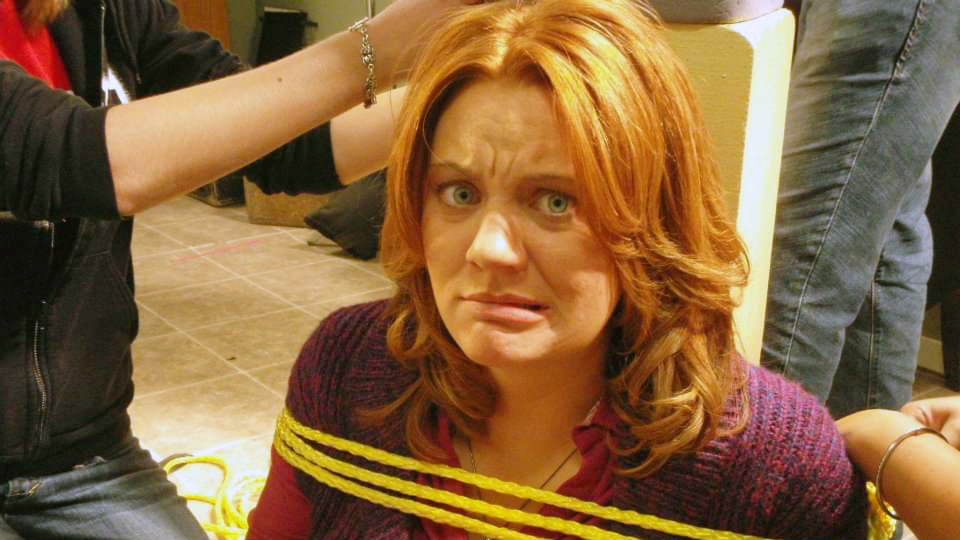
Learning and growing
Over the last four years, Juszkiewicz has been participating in Hockey Canada's Women Master Coach Developer (WMCD) program, an elite initiative that is providing 38 high-performance women’s hockey coaches with the skills they need to deliver clinics and train future facilitators and evaluators as part of an effort to increase the number of women-led coaching programs nationwide.
“It's been able to give me that extra credibility, that extra training and that extra guidance that I find I am now using with all coaches that either I work with or work for me,” Juszkiewicz says about the program, which she is set to complete later this year. “It’s been a wonderful opportunity to understand how to work with people how to train them, how are you going to create a learning environment as opposed to more of a lecture and just listen to what I have to say environment.”
WMCD participants are nominated by Hockey Canada Members and must have completed several certification and training courses to even be considered. One of the biggest benefits of being in WMCD has been connecting with 37 other highly talented women, says Juszkiewicz.
“I am one of the only women in my province in the program. If I didn't have the ability to connect with other girls in other provinces, I would feel pretty lonely and like I was on my own little island. So, I think the best part is that you are getting some of the top minds across the country in terms of female leadership and female hockey getting together and that is very empowering,” she explains. “It's extremely empowering to know that you're not by yourself.”
Juszkiewicz’s hard work and continuous dedication to her craft over the years has paid dividends. In 2021, she was named BFL Female Coach of the Year for British Columbia in the Community category, and in 2022 she was awarded the BC Hockey Development Award for coaching. She says her drive for continuous learning and growth is fueled by her desire to continue coaching in the game she loves.
“If you don't continue pushing yourself to learn and develop, you get stagnant and ultimately you get left behind.”
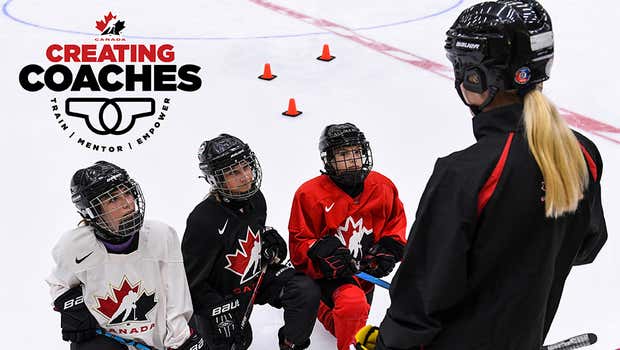
Eight student-athletes to participate in Creating Coaches program
Creating Coaches’ third cohort runs until end of 2024-25 season
CALGARY, AB – Hockey Canada and U SPORTS have announced the eight student-athletes who have been selected to join Creating Coaches, a program designed to increase the number of women coaching hockey in Canada, as part of its third cohort which will run during the 2023-24 and 2024-25 seasons.
Launched in 2021 through a partnership between Hockey Canada, U SPORTS and the Hockey Canada Foundation, Creating Coaches provides training and mentorship to current U SPORTS student-athletes who are concurrently looking to begin their coaching careers. Participants in the program serve as an assistant coach with a U13, U15 or U18 girls’ hockey team for the duration of the two seasons and receive coach education, professional development opportunities and an honorarium.
This year’s cohort includes student-athletes from eight U SPORTS women’s hockey programs across three of its conferences:
• Alexis Anonech (York University, OUA)
• Emmy Fecteau (Concordia University, RSEQ)
• Lyndsey Janes (Mount Royal University, CW)
• Madison Laberge (Nipissing University, OUA)
• Isabelle Lajoie (University of Alberta, CW)
• Sophie Lalor (University of Saskatchewan, CW)
• Sarah-Maude Lavoie (McGill University, RSEQ)
• Chihiro Suzuki (Guelph University, OUA)
“We are thrilled to welcome these eight accomplished student-athletes to Creating Coaches and look forward to working with them during the next two seasons,” said Marin Hickox, Hockey Canada’s vice-president of women and girls’ hockey. “Creating Coaches is an important program to support and develop hockey’s next generation of leaders and we are grateful to the U SPORTS coaches who nominated this talented group.
“Girls who have been coached by a woman are more likely to transition into a coaching role at the end of their playing careers, and it is our intention that this program will positively influence the recruitment and retention of girls and women in leadership roles in the sport.”
Since its inception, Creating Coaches has included student-athletes from 16 U SPORTS women’s hockey programs and all four of its conferences.
“The eight student-athletes selected to join Creating Coaches are tremendous ambassadors for hockey and university sport in Canada,” said Lisette Johnson-Stapley, chief sport officer at U SPORTS. “We have already seen the positive impact that this program has had inspiring young girls in communities across the country and we are excited for Alexis, Chihiro, Emmy, Isabelle, Lyndsey, Madison, Sarah-Maude and Sophie to begin their coaching careers while continuing to represent their universities with pride as student-athletes.”
The Creating Coaches selection committee includes representation from Hockey Canada, U SPORTS, Hockey Canada’s Members and the Hockey Canada Foundation Board of Directors.
During National Coaches Week, Hockey Canada is celebrating the positive impact that coaches have on athletes in communities from coast to coast to coast, with #ThanksCoach resources and features shared here.
To learn more about Hockey Canada, please visit HockeyCanada.ca, or follow along through social media on Facebook, X and Instagram.
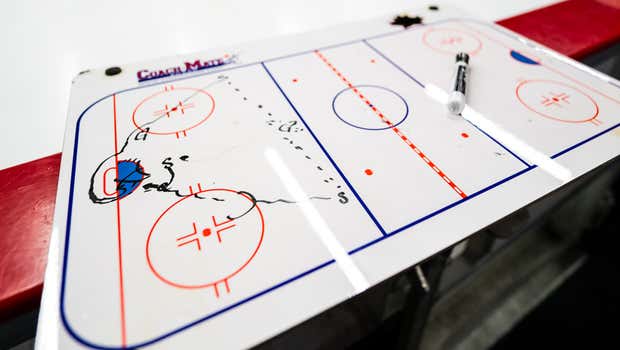
Resources for Canadian coaches
From upcoming training opportunities to ideas for skills and drills, Hockey Canada has a variety of resources available for coaches of all levels across the country
Coaches are the backbone of the hockey community. Whether you are a regular behind the bench or it’s your first season as a coach, Hockey Canada has a variety of resources available to help you succeed on your coaching journey.
How do I start my coaching journey?
If you want to get started coaching, make Hockey Canada’s National Coach Certification Program (NCCP) your first stop. This program enables coaches to build their coaching tools and knowledge of the game to work effectively with their players. Hockey Canada offers six coaching clinics and five instructional stream areas of focus.
Those looking to be trained to coach in the Community Sport stream can participate in Coach 1 — Intro to Coach or Coach 2 — Coach Level. NCCP certification is not required at either of these levels; a coach will remain trained indefinitely after completing these streams. Register for a coaching clinic or visit your Member website for more information.
Respect in Sport
The Respect in Sport Activity Leader/Coach program is an engaging and easy-to-use online training course that helps hockey coaches and youth leaders recognize, understand and respond to issues of bullying, abuse, harassment and discrimination. The course also aims to build a holistic culture of respect within the sports community and provide fundamental training tools to enable all coaches to become even better role models for the young athletes in their care.
In Canadian hockey, more than 230,000 coaches are certified by the Respect Group Inc.
Skills and drills
The Hockey Canada Network gives coaches and players the tools to succeed with drills, skills, videos, practice plans and articles on their tablet or phone. There are over 1,500 drills and more than 100 lesson plans available on the app, with more added throughout the season.
Looking for more drill inspiration? Hockey Canada will frequently post skill videos on its social channels that can be incorporated into practice plans. Search the hashtag #HCSkillsCoach and #HCGoalieCoach on X (formerly known as Twitter), Facebook and Instagram to find more drill videos to utilize on the ice.
Drill Hub is another resource available to find skills and drills for players. It is a free resource for coaches to access hundreds of drills and videos. There are also pre-made practice plans available to download, along with templates for game rosters, player stats, scouting reports and more.
Women in coaching
We Are Coaches
As a free, women-only coach program, We Are Coaches was designed to increase the number of trained women coaches in Canada in order to provide mentors and role models for young participants. The program aims to build infrastructure to support and sustain the participation of girls and women in hockey in Canada, develop women role models and leaders within the hockey community and remove barriers to coaching education for women.
Women Master Coach Developer
Launched in 2019, the Women Master Coach Developer (WMCD) program introduces more hockey coaching programs led by women. The program has equipped 38 coach leaders to not only deliver coach clinics, but also train future facilitators and evaluators in each Member.
To participate in the program, delegates can be nominated by their Member each season. Delegates are required to complete multiple trainings and certifications in the program, and upon successful completion, they will take a leadership role to optimize the delivery of the We Are Coaches program and support women coaches within their communities.
Creating Coaches
In 2021, the Hockey Canada Foundation partnered with U SPORTS to launch Creating Coaches, a program designed to increase the number of women in coaching positions in Canada. This two-year mentorship program places a focus on training, mentoring and empowering women behind the bench.
Candidates for the program are nominated by their U SPORTS coaches to participate in Creating Coaches.
How do I get further coaching support?
Are you looking for more support? Do you have a question about coaching in your community? Hockey Canada and its Members have coaching resources and helpful staff available to help you on your coaching journey.
Click here to find the coaching contact information for your Member.
Do you have more questions about coaching? Visit these Frequently Asked Questions pages to learn more about the following topics:
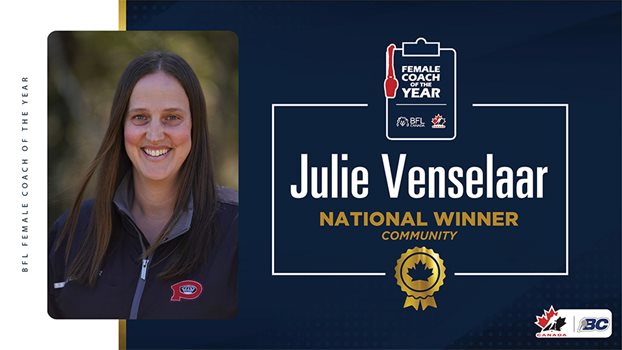
Building a community around hockey
BFL Female Coach of the Year Julie Venselaar is growing hockey in Powell River, B.C., by creating opportunity for girls and women to share the ice together
Hockey has always been a source of community for Julie Venselaar.
Playing in women’s drop-in sessions in the coastal city of Powell River, B.C., the women in the session felt there needed to be more options for girls and women to play hockey together. With no organized leagues, it was a gap that needed to be filled.
When they approached Venselaar asking if she wanted to be involved, it was a no-brainer.
“I truly believe that it is so important for girls to have an activity or sport as they head into their adolescence years,” Venselaar says. “The group created a time for these girls to come out and to be coached by women, have fun and have some girl time, and when my daughter was old enough, they asked if I wanted to join and help out, [and] I said yes.”
With girls playing integrated hockey in boys’ leagues, the sessions evolved from being just additional skates to becoming a full girls’ team, and it strengthened the game in Powell River. After eight years of coaching, Venselaar has continued to be involved in organizing and volunteering her time in on-ice activities, fostering a space for girls to play hockey together. Almost a decade later, she still feels fortunate to be able to be a part of the growth of hockey.
A full-time teacher, Venselaar is passionate about children growing up in a positive environment. That commitment to creating a community through hockey has earned Venselaar the BFL Female Coach of the Year award in the Community category.
“There’s nothing better we can give our girls and our daughters than that sense of having something to anchor them through those tricky times in life,” she says. “Part of why I do what I do is to build that community, to build that safe space around them and to surround them with good role models who are there to love and support them. Hockey is something that I know is a medium for me to do that and it’s great because it allows these amazing girls to learn skills from being a part of a team.”
But the most special part for Venselaar has been sharing her coaching journey with her daughter. As part of her prize for earning the BFL honour, Venselaar attended the gold medal game at the 2023 IIHF Women’s World Championship in Brampton, Ont., with her daughter by her side
“It was so awesome to be able to share that with my daughter,” Venselaar says. “It was so inspiring to be there, and to see it live, with the extremely talented athletes, it was amazing. The best part is that they’re amazing people, too. The players were waving to the crowd and my daughter loved it.
“We made a sign for Micah Zandee-Hart because she was the only player from B.C., and Micah came over, smiled at us before tossing my daughter a puck and it really made her day.”
At the end of the day, Venselaar wants to make sure that it isn’t just her efforts growing the game. She’s very proud of what her community has been able to do together and hopes it continues to expand.
“Our hockey community of parents, coaches, players, and more, they’re bringing it all together and supporting our girls and creating something that’s for them,” Venselaar concludes. “I am here to guide things along, but I’m just part of an amazing team that brings the community together.”
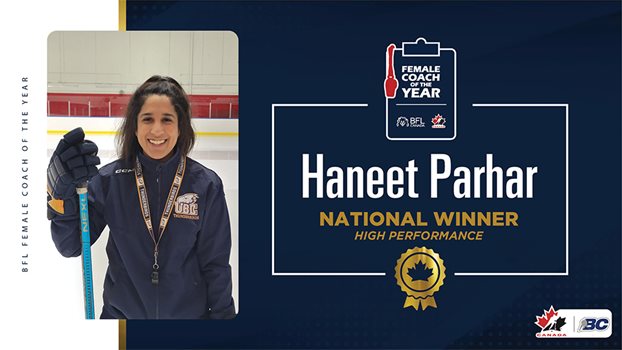
Circling back to hockey
Haneet Parhar thought she was done with hockey after university, but through coaching, the BFL Female Coach of the Year found her way back to the game
Haneet Parhar didn’t always have hockey in her plans. But for one reason or another, hockey always found a way back into her life. And for that, Parhar is forever grateful for the opportunities she’s had through the game.
Her passion for giving back to the sport that gave her so much has led to her being honoured as the BFL Female Coach of the Year in the High Performance category.
“There’s been so many times in my life where I’ve told myself ‘This is it, I don’t know if I’ll ever go back to a rink or pick up my skates,’ and then boom, I come back to hockey,” Parhar says.
As a student-athlete at the University of British Columbia, there was a lot of uncertainty if she would even make the Thunderbirds roster. She would eventually have a very successful U SPORTS career, winning three Canada West championships, but her time at UBC also kicked off a career in coaching that she never imagined.
From wanting to just stay involved as an 18-year-old undergrad student, working as a coach in community rink programs and UBC hockey camps in the summer, it reminded Parhar of the joy she found in hockey, for herself and the kids in her programs.
“Doing it throughout my school and varsity career at UBC, I coached at the recreational level for five-and-a-half years,” she says. “When you start at that level, I really did it because I loved it. You see the kids smile and it’s really easy to take away that hardcore style of coaching and do it for fun. It was a great fit for me.”
Coaching kids from ages six to 15, not only did it motivate Parhar to get the kids to participate, but it also reminded her how special it was growing up with hockey.
“It reminded me of when I was young when we played sports for fun, too. Being able to provide that opportunity for kids to have a safe space for themselves and allow them to branch out, that’s what matters.”
When her Thunderbirds career came to an end in 2017, Parhar was ready to hang up the skates, with the expectation that she had already given everything she had to the sport. Looking back to her time in appreciation, she’s thankful for how all the coaching staff, led by head coach Graham Thomas and assistant coach Mike Sommer, inspired her. It wasn’t until after she left the UBC program that she realized how far their influence went.
A year after graduating, working full-time while coaching for fun on the side with her hometown North Shore Avalanche, Parhar received a call from Thomas that opened up a new path in her life.
“I didn’t think coaching would be my end-all, be-all,” Parhar explains. “I wasn’t a star player, I wasn’t a captain, but [Thomas] said he wanted a new voice. I came in with my experience as a player who knew the culture and the system, what it meant to be a role player and owning it, and I was there for the girls as someone who went through five years with the team.”
After a single season back at UBC, Parhar decided she wanted continue to explore her career options, deciding to give up the game once again, pack up and move to England to pursue a degree in law. And as the sport would have it, hockey found her again.
“I was sitting in England during the pandemic, waiting for a train in pouring rain, just two months away from graduating in May, when I received another phone call from Graham. It had been two years since I last coached, and he asked me if I’m coming home and if I’d be able to coach in the upcoming year,” Parhar recalls. “Of course, I say yes, and I go to training camp and see the players, and instantly that passion came rushing back.”
Since then, she’s been able to not only provide coaching on the hockey side, but also bring her experience of being a former player that thought they had nothing left to give to the sport, before realizing the importance of sticking with her passion.
This past year, on top of holding the role of assistant coach with the Thunderbirds, Parhar also continued to coach within the community with the Vancouver Female Ice Hockey Association. At the community level, she’s continues giving back and supporting young girls in hockey, much like how she was supported growing up.
“For a lot of female hockey players now, they didn’t have a female role model, so now that I’m in that position, I think of how cool it must be for these girls to grow up having a role model that they can truly relate to,” Parhar says.
At the end of the day, although it wasn’t always her plan to be a coach, Parhar is enjoying every moment of it, and working to share her experiences with hockey and what it has meant to her after all these years.
“It’s always been for the kids,” Parhar concludes. “To have someone they can see that looks like them, as tall as them, I want to be there for the girls and show them that all they need is the right energy, positivity and determination.”
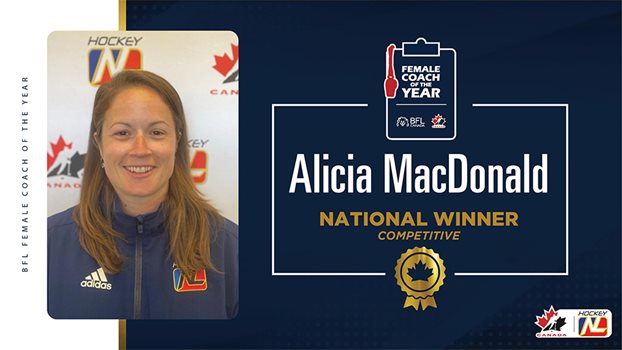
Diversifying the bench
Working in part with the Newfoundland Growlers, BFL Female Coach of the Year Alicia MacDonald’s belief is creating opportunities for herself and for others
Coaching hockey since her days as a student at St. Francis Xavier University in Nova Scotia, Alicia MacDonald has since been behind the bench for more than 20 years.
And during that time, whether it’s reaching out to organizations for her own growth or advocating for more diversity behind the bench, MacDonald has tirelessly worked towards making hockey more inclusive for everyone.
That’s a big reason why the Onslow Mountain, N.S., product has been named the national winner of the BFL Female Coach of the Year in the Competitive category.
“Having the opportunity to see what the opportunities are, whether that’s as an official, or coach or training staff, being and seeing all that, being aware of it, brings more diversity to the game,” MacDonald says. “It’s important that the young girls and kids see the potential, and I see so much value in it and I want to be a face that’s visible to them.”
Growing up, playing on the community boys league and eventually the girls’ team when the opportunity came up, MacDonald first started gravitating to coaching during university. Wanting to give back to the girls in the community and seeing the positive reactions to them having a female role model has pushed MacDonald to want to see more females continue in the sport. Since then, she has continued to refine herself, learning and growing her knowledge of the sport and coaching so that she can apply it to her own teams.
This season, she worked with the ECHL’s Newfoundland Growlers, shadowing the coaching staff and continuing her development. With no university or other high-performance teams in rural Newfoundland, the Growlers were the only option for her if she wanted to learn in a professional environment. With the organization, she was able to discuss tactics with the Growlers staff, go through video sessions with the team, and provide her thoughts and her experience, while receiving feedback.
That’s why MacDonald preaches the importance finding her own opportunities. From starting out working with local minor hockey teams to serving as an assistant coach with the Newfoundland and Labrador women’s team at the 2023 Canada Winter Games to her most recent role as head coach of the provincial U14 team, it’s about getting comfortable in putting herself out there and looking for opportunities.
“Working with coach Eric Wellwood and the Growlers, I’ve really learned from that program and set myself in a more professional organization,” MacDonald says. “The biggest thing is about being able to take the leap. There’s always going to be situations where you don’t know the solution, but that’s okay. It’s just about trusting the coaches and mentors around you and taking the plunge and going for it.
“We don’t have too many professional opportunities in Newfoundland so it goes back to putting myself out there and asking for situations that I could be involved, and I’ve learned a lot from the coaches and the players.”
With the spotlight that comes with her BFL honour, she hopes to continue her goal of bringing more diverse voices into hockey.
“There were a lot of deserving coaches out there and I hope programs like [BFL Female Coach of the Year] continue so that coaches do feel validated and heard,” MacDonald says. “As a nation, we can be better at highlighting the LGBTQ+ and BIPOC community, creating that diversity for everybody to see what the options are and there’s still a way to go.”
For now, MacDonald hopes she’s able to spread visibility of women behind the bench so others can feel inspired to step up and speak up to achieve their goals. But once spoken, their words will be heard and respected.
“It’s about getting used to speaking up in a room of men and sharing thoughts and opinions,” MacDonald says. “They’re always welcomed and valued, it’s just about believing in yourself.”
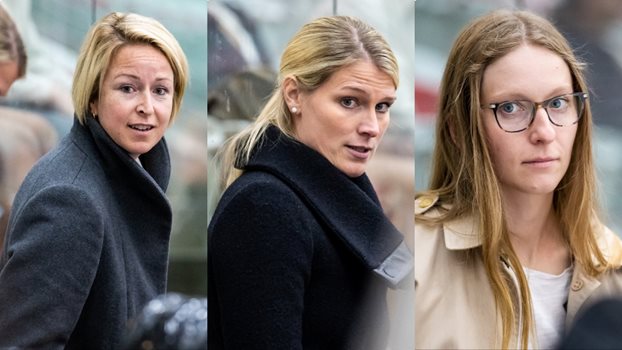
If you see it, you can be it
Growing the game beyond the ice, Courtney Birchard-Kessel, Tara Watchorn and Stefanie McKeough made history as the first all-women coaching staff in under-18 program history
On the ice, Canada’s National Women’s Under-18 Team completed a three-game sweep of the United States in its summer series for the first time since 2007, but behind the bench, the coaching staff was making a little history.
Head coach Courtney Birchard-Kessel and assistants Stefanie McKeough and Tara Watchorn became the first all-women coaching staff in the history of Canada’s women’s U18 program. The result against the Americans was terrific, but the impact the series will have on growing women’s hockey goes beyond the ice.
“We’re in such a good time for women in coaching positions,” says Watchorn. “With pioneers like Hayley Wickenheiser and Caroline Ouellette, it’s great to see that women are starting to get in on the coaching side now and there’s a path to making coaching a career, which was really tough before. It’s really cool to see that transition where a wave of players who have already had a hockey career now able to move into coaching.”
To add to the accomplishment, all three members of the coaching staff are alumnae of National Women’s Program, having shared the ice together at camps and events over the last decade and a half, including a golden experience with Canada’s National Women’s Development Team at the 2011 MLP Cup, the only time the three wore the Maple Leaf together.
Combined, the three played 183 international games; Birchard-Kessel appeared in three IIHF Women’s World Championships, winning gold in 2012, Watchorn was an Olympic gold medallist in 2014 and played at three women’s worlds, and McKeough was part of the Canadian contingent at the 2009 IIHF World Women’s U18 Championship.
So coming back to the national program and having a reunion of sorts behind the bench meant a little bit extra for the trio.
“Between the three of us, our paths have crossed so many times throughout our own playing careers, and we have a lot of shared experiences and values we learned along the way,” Watchorn says. “For the under-18 age group, they’re so young and for a lot of them, it’s their first high-performance environment. So, for us to be able to understand and anticipate those stressors and telling them to focus on just being present, enjoying the time with teammates and making them better, you’re always going to play better.”
Watchorn has always wanted to be a coach. Even during a successful playing career that included Olympics, women’s worlds and hoisting the Clarkson Cup with the CWHL’s Boston Blades of the CWHL in 2015, Watchorn knew she wanted to pass on the positive experiences she’s had in the game.
“I am so fortunate to be part of cultures and teams that truly changed my life,” says the Newcastle, Ont., native, who is the first-ever head coach of the women’s program at Stonehill College, “so my hope is to create that environment and culture for other young women who can come through and be inspired [and] challenged, and become leaders and people who impact the world.”
Although coaching isn’t always the plan for players, hockey sometimes finds a way back. After hanging up her skates after a five-year college career at the University of Wisconsin (which included an NCAA national title in 2011), McKeough thought coaching was one of the last things she would be doing with her free time.
But the game eventually took her to Sweden, where she was able to get a taste of coaching and was bitten by the bug. To this day, McKeough admits it continues to surprise her every time she walks into the rink as a full-time coach.
“Hockey players are humans first,” the Carlsbad Springs, Ont., product says. “I learned through coaching that we have to help the person before helping the hockey player, and being able to be there for somebody is something that motivates me when I show up at the rink every day.”
As an assistant coach with the University of Ottawa, McKeough gets to work and learn from veteran U SPORTS coaches like Vicky Sunohara (Toronto), Rachel Flanagan (Guelph) and Gee-Gees bench boss Chelsea Grills. They’ve been able to set examples for McKeough previously as a player and now as a coach.
“Vicky was actually one of my coaches at my first U18 camp and Rachel was an assistant coach during one of my years on the under-22 team, so now that I get to work with them, I’ve been able to gain a more deeper respect for what they do as coaches.
“By having those ’If you see it, you can be it‘ situations, I’ve been able to continue to build those relationships with other coaches and the players.”
The growth and visibility of women in coaching and leadership positions continues to grow. Just this summer, Hockey Canada alumna Jessica Campbell was hired as an assistant coach by the AHL’s Coachella Valley Firebirds, longtime national team defenceman Laura Fortino took on the same role with the OHL’s Hamilton Bulldogs, and 2022 Olympic gold medallists Marie-Philip Poulin and Rebecca Johnston took on player development roles with the Montreal Canadiens and Calgary Flames, respectively.
“Diversity in leadership is so valuable,” Watchorn says. “For people to bring different backgrounds, and to be able to relate to the players, it’s just so important. If you see it, you can be it.”
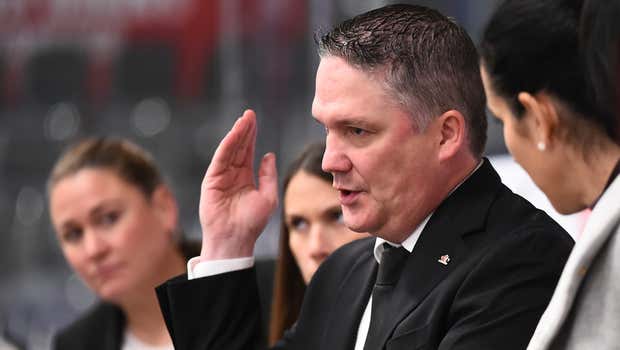
In my own words: Troy Ryan
The gold medal-winning head coach reflects on how he got involved in the women’s game, what makes Canada’s National Women’s Team so special and the best advice he’s received
My first introduction with the women’s game was many years ago when I was playing hockey at the University of New Brunswick in the mid-1990s. They didn’t have a women’s varsity team, but they had a club team, and every once in a while, the team needed extra support with coaching. So, for a brief time while I was playing, I jumped on the ice to help.
After that, I started to build my own coaching career on the men’s side. I was actually in Calgary working at Hockey Canada’s under-17 camp and I received a call from Darren Sutherland at Hockey Nova Scotia. He said they had to make a last-minute coaching change for their Canada Winter Games women’s hockey team, and called me first to see if I had anyone I would recommend. I think I gave them three names, but two weren’t available and one wasn’t interested, so they called me back and just asked me if I would be interested. I jumped at the opportunity and I coached at that Canada Winter Games in 2015.
The following year, that group of women I coached at the Canada Winter
Games got together and wrote a letter to Hockey Nova Scotia to recommend me
or nominate me for a coaching award, and I ended up winning that award.
It’s kind of a cheesy part of the story, but they were playing on my
heartstrings a little bit and I got hooked to women’s hockey right away.
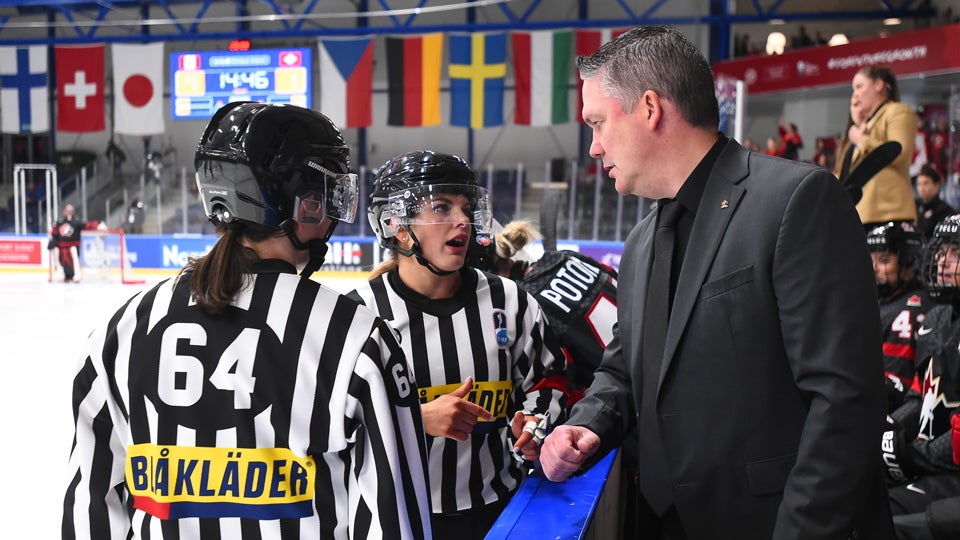
One of the biggest reasons why I love coaching in women’s hockey is the passion they have for the game. The other part is just the high-performance side of it—when you’re coaching these women, they are true professionals. They invest almost all their time in their craft. But it really comes down to their passion. The passion they have for the game, the passion they have to play for their country and the passion they have for each other really separates them from anybody else that I’ve ever coached. They are just a special group of athletes.
I honestly feel spoiled all the time working with Canada’s National Women’s Team. Every day is fun working with these players and staff. I think the biggest thing driving me as a coach is I still think this group has room to grow. I think we’ve taken huge strides in the right direction. We’re a better team now than we have been in the past. They genuinely care about each other’s success, and they share in those successes. I just still think there’s room to improve, and if I didn’t believe that, I wouldn’t be doing my job.
Some of the best parts about coaching this team are things no one would ever see. Like when you have a video session with an athlete and you bridge a gap with them and you can see them excel in that area on the ice. It’s just that little look you get when they come off the ice after they’ve accomplished something that you’ve discussed with them. Those moments to me are the real special ones. The wins and all that, that’s obviously fun, but a lot of the times they’re more of a relief than they are a high moment. It’s the little moments along the way.
I remember one special moment at the Olympics in Beijing. Because of COVID-19, the athletes had to put the medals around each other’s necks. That was just so unique and special. You look at each one while they’re doing it, and you just have a story in your head for each of those people. Maybe it’s an obstacle they had to overcome to be in that situation. Several of them had been released from the team prior to world championships, and they did what they could to get back into the mix. So, I remember just almost checking out mentally during that five-minute span of the medal ceremony and just reflecting on some of the cool stories that each person had to overcome to get to that moment. To see them getting an Olympic gold medal around their necks from one of their teammates was a pretty cool experience.
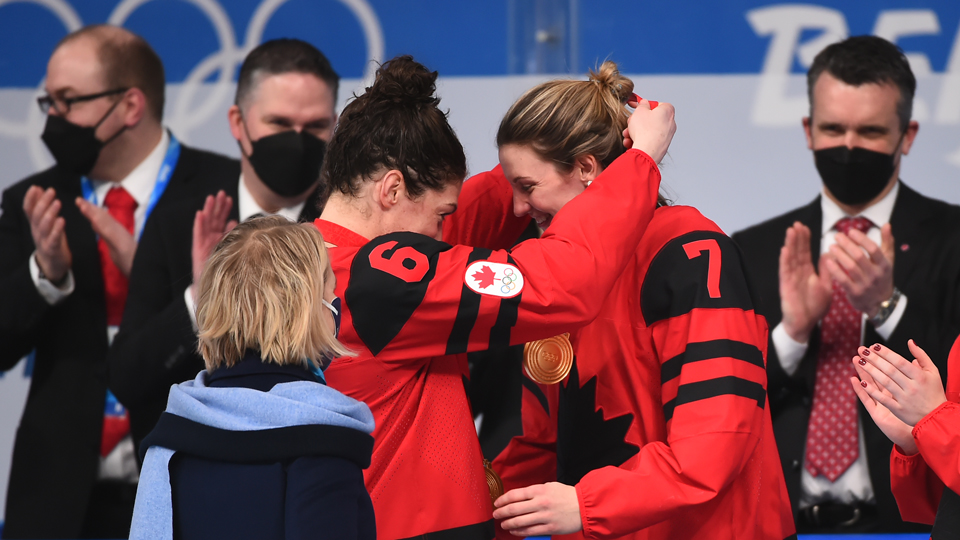
Mike Johnston coached me at the University of New Brunswick. He’s actually Rebecca Johnston’s uncle, which is funny. When I first started coaching, he told me no matter what I do in hockey, always have your province’s back. A lot of people, when they first get that opportunity in U18 or junior hockey, they forget about their provincial program. I looked up to him so much when I was younger, so I always made sure that no matter what job I had in the game, if Hockey Nova Scotia ever reached out to me, I’d be there to volunteer and to help. If I had went along my route of coaching in junior hockey or university hockey, I never would have had the experiences that ended up benefitting me the most with this job. The best experiences I had with my provincial Member were participating in short-term events, working with the best players and coaches, and gaining more high-performance experience.
Another good piece of advice I got a long time ago was simple—meet people where they’re at, even at the national team level. There are athletes coming in that are four-time Olympians, then there are some that are just hoping to get centralized or make a world championship team. As a coach, it’s so important to understand the different dynamics, and the dynamics in the women’s game tend to be much different than in the men’s game.
When I first started coaching, one of the typical questions people asked me was the difference between coaching men and coaching women. I think a lot of people make a mistake in trying to put an umbrella over their group. I always thought good coaches coach their athletes as individuals. Take the time to get to know your athletes and know what goals they have and what they want to achieve. Right now, we are trying to build our program to win a gold medal at the 2026 Olympic Games. In order to get there, I think we need to really take care of a lot of the individual stories that are involved on our team. That will be a bit more of my focus in these first few years of the quad as we get ready for 2026.
For more information: |
- <
- >
